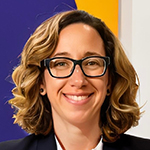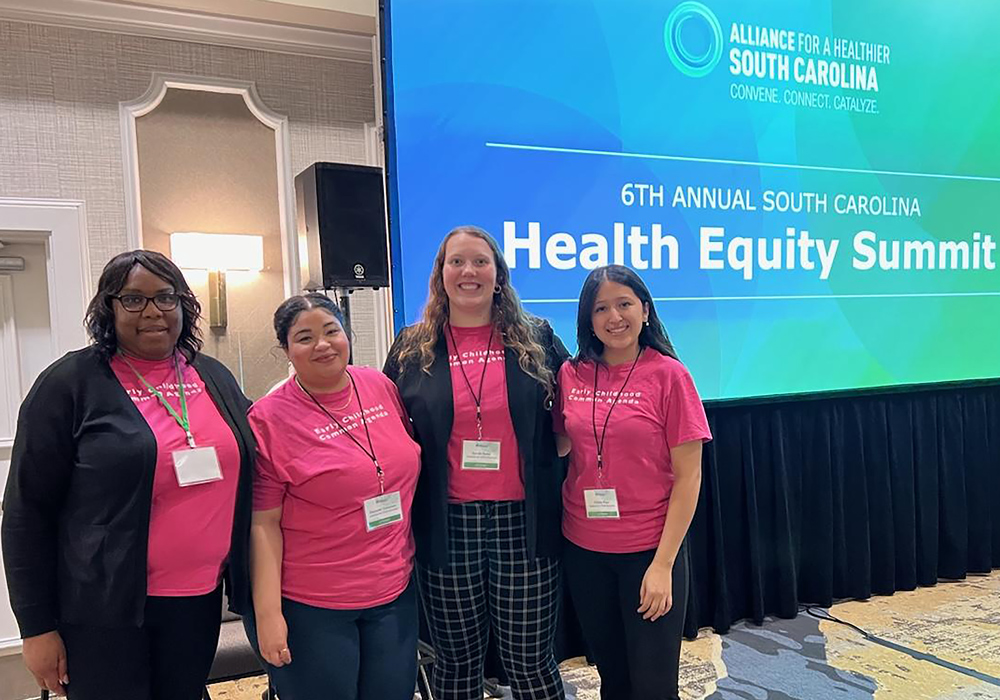College of Social Work professor Ann Gowdy sees it as her goal to equip her students with the knowledge that people with lived experience should be invited to the table to talk about housing issues and solutions.
Over the past eight years, Gowdy served as an adjunct faculty member and worked for an agency that provided housing and homeless services in the Pee Dee region. Her focus became understanding how young people in rural areas experience homelessness.
“Rural is something that is real to me and not just the areas I work in,” she says.
Now that she is a full-time faculty member, many of the graduate-level classes Gowdy teaches are the baselines for what future social workers need to know in the field. These include teaching social research methodology, advanced interventions in social work practice, and a course focused on diversity and social justice issues.
“Rural areas have the same needs as urban areas,” Gowdy says. “They just don't have as many resources and social workers who are able to serve them. That's why rural social work is so important.”
One of the most effective ways she’s found to demonstrate this need to graduate students is by hosting guest speakers from community organizations who can further their understanding by making deeper connections.
“The Eastern Carolina Housing Organization employs folks with lived experience,” Gowdy says. “Their CEO, Joey Smoak, talked about folks with lived experience who are now working in professional settings and serving folks within our community who are at risk and experiencing homelessness. Because they serve the entire Pee Dee region, students were able to make the connection that there are areas outside of Columbia with needs.”
Gowdy says it resonated with students when they talked about recovery-ready workplaces and the importance to have mechanisms in place not only to recruit and hire people in recovery but retain them in the labor force.

“Advocacy is not just talking to people. It’s about including folks as experts and advocates for themselves. Bringing the community into the classroom makes learning real for students.”
“Whether it’s Columbia, or the state or across the country, it’s about having the basic need of housing met. It's challenging for folks to work on being able to aid themselves with being in a safe place to be able to work on their education, employment, social connections and their overall health and well-being.
“It's really hard when you are in survival mode,” Gowdy says. “And that's what you have to focus on.”
Sarah Boler, one of Gowdy’s students and a recent graduate, now works full time at the South Carolina Department of Alcohol and Other Drug Abuse Services.
“She recognizes that outside of the classroom opportunities are just as important as the academic knowledge, and a lot of it is about building skills,” Boler says. “It's helped a lot with my current job, getting to understand how social work and public health can really work together.”
Understanding connections and creating networks
Part of Gowdy’s goal as full-time faculty was to shift into teaching about community policy organization on a macro level. Her classes on nonprofit leadership and advanced theory and policy cover topics that shape the advocacy before going into the field.
“A lot of the work I’ve done is about turning ideas into actions,” Gowdy says. “Advocacy is not just talking to people. It’s about including folks as experts and advocates for themselves.
“Bringing the community into the classroom makes learning real for students.”
Terry Wolfer, the College of Social Work’s associate dean for curriculum, said it’s exciting when faculty members facilitate the kinds of interactions that Gowdy encourages.
“These experiences enable students to meet and begin relationships with South Carolina leaders and other stakeholders, giving them a head start in the transition from university classrooms to professional practice,” he says.
Danielle Coleman, who earned her master’s in social work in May, says she enjoyed the several classes she took under Gowdy because it allowed her to meet future cross-profession collaborators.
“It was nice to be with like-minded people while also getting different viewpoints and opinions from other professionals, such as doctors, nurses and community health workers.”
In her Nonprofit Leadership class, students learn the components of strategic planning, from governance to human resources, financial management, marketing, organizing and evaluation.
For this class, Gowdy invited speakers who served youth and young adults, some in the space of homelessness, to share details about what it's like to be in charge. The speakers were honest and real about what it is like to lead and be responsible for a nonprofit organization.
“The students received pro tips about the hard work,” she said. “It was like being able to bring a dense textbook to life.”
Gowdy also arranged for students to attend a legislative reception and luncheon to meet leaders of organizations and state agencies. She says it was important that students were able to break down the myths and fears of what that could be like.
“When you hear ‘legislative reception’ when you're 22 or 24, that can be intimidating,” Gowdy says.
The intersections of how a variety of systems of individuals, small nonprofits and local coalitions are involved can be hard to connect and understand. Gowdy’s challenge is how to make the complexities comprehensible for students so they are able to better understand underlying issues of homelessness.
“A student can say, ‘Hey, I'm gonna go volunteer at the Transitions homeless shelter in downtown Columbia,’ but it’s better when they acknowledge all things homelessness,” Gowdy says. “Being able to help connect early childhood challenges is an important piece for housing and homelessness. They now realize you need to understand early childcare, K through 12 and the school system, or that the Department of Corrections is releasing youthful offenders.”
Her class Advanced Analysis of Social Policy, Programs and Services addresses the role of social workers and the social work profession in shaping and implementing policy. For this class, Gowdy empowers students to arrange guest speakers and encourages them to ask questions about the experience of shaping policy and how it is done.
“Every speaker in our policy class worked in the space of homelessness, and that was fantastic,” Gowdy says.
Shaping ways to work together
When the Alliance for a Healthier South Carolina held its sixth annual summit on Advancing Health Equity in South Carolina, Boler and Coleman attended via scholarships Gowdy helped arrange through the Institute for Child Success.
The students took part in the Early Childhood Common Agenda, where they advocated for 10 items to be addressed during the state’s legislative session. One of the items was safe and stable housing for children and families.
After learning about policy briefs in a class, students were literally able to see, hear and feel what it is like to shape one.
“Enacting all these lofty ideas and seeing people in the field that were actually going to do it was awesome,” Boler says.
As part of the process, these students were able to speak up and see which items were included on the agenda.
“It made homelessness and housing not just an issue in a vacuum,” Gowdy says. “We could get a billion dollars from the federal government today, but if we do not have landlords who are willing to rent to folks, the money is meaningless.”
When students participate in real world experiences beyond the coursework, it helps their learning come alive and become a sturdier bridge to future success.
And Gowdy was surprised to see an unexpected additional value to bringing community leaders into the classroom.
“Almost every speaker had job openings at their organizations,” she says. “I heard them tell students, ‘Please stay in touch, we'd love to have you join us.’”
Boler says the most important thing she took from completing her class was how Gowdy stressed the importance of networking by giving each student a parting gift.
“At the end of our class together, she gave all of us a little miniature notebook so that if we're out in the field and we want to network and get those contacts that we can,” Boler says. “She encouraged us to use each other for future contacts, because you never know what resources somebody else is going to know about that could really help your organization and your future clients. A lot of organizations do the same work, but not together because they don't know what the other ones are doing.
“That's always what I will remember about Dr. Gowdy, that act of kindness that she did for us the last day of class.”
